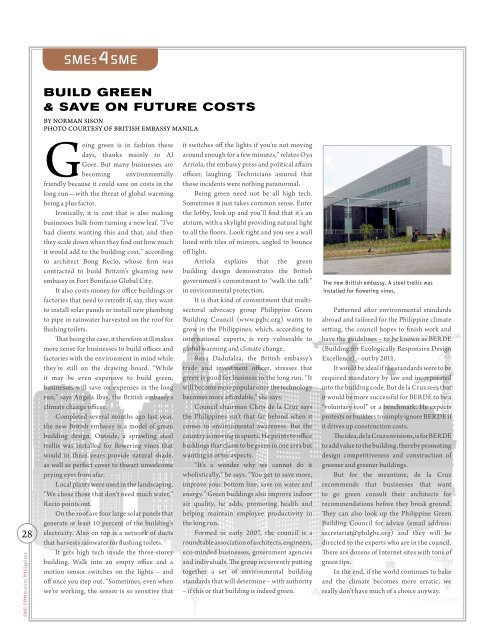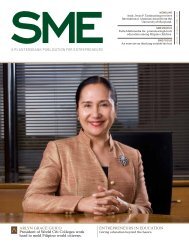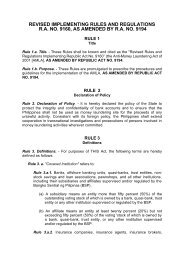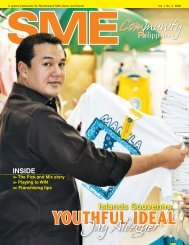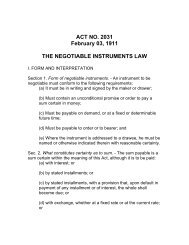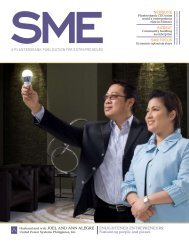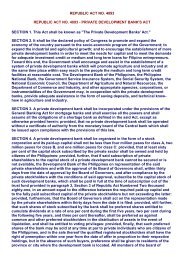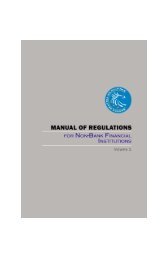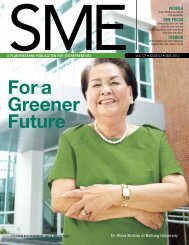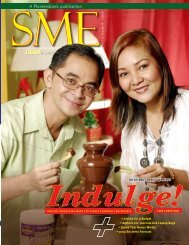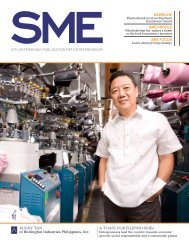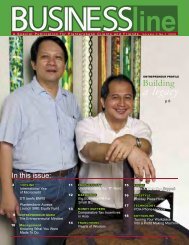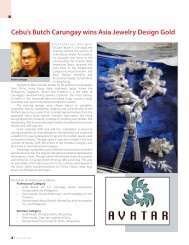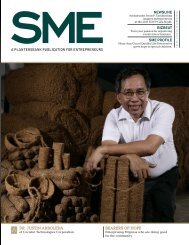Ecopreneurs - Planters Development Bank
Ecopreneurs - Planters Development Bank
Ecopreneurs - Planters Development Bank
Create successful ePaper yourself
Turn your PDF publications into a flip-book with our unique Google optimized e-Paper software.
SMEs4 sme<br />
Build Green<br />
& Save on Future Costs<br />
By NORMAN SISON<br />
Photo courtesy of british embassy manila<br />
28<br />
SME COMmunity PHilippines<br />
Going green is in fashion these<br />
days, thanks mainly to Al<br />
Gore. But many businesses are<br />
becoming environmentally<br />
friendly because it could save on costs in the<br />
long run—with the threat of global warming<br />
being a plus factor.<br />
Ironically, it is cost that is also making<br />
businesses balk from turning a new leaf. “I’ve<br />
had clients wanting this and that, and then<br />
they scale down when they find out how much<br />
it would add to the building cost,” according<br />
to architect Bong Recio, whose firm was<br />
contracted to build Britain’s gleaming new<br />
embassy in Fort Bonifacio Global City.<br />
It also costs money for office buildings or<br />
factories that need to retrofit if, say, they want<br />
to install solar panels or install new plumbing<br />
to pipe in rainwater harvested on the roof for<br />
flushing toilets.<br />
That being the case, it therefore still makes<br />
more sense for businesses to build offices and<br />
factories with the environment in mind while<br />
they’re still on the drawing board. “While<br />
it may be even expensive to build green,<br />
businesses will save on expenses in the long<br />
run,” says Angela Ibay, the British embassy’s<br />
climate change officer.<br />
Completed several months ago last year,<br />
the new British embassy is a model of green<br />
building design. Outside, a sprawling steel<br />
trellis was installed for flowering vines that<br />
would in three years provide natural shade,<br />
as well as perfect cover to thwart unwelcome<br />
prying eyes from afar.<br />
Local plants were used in the landscaping.<br />
“We chose those that don’t need much water,”<br />
Recio points out.<br />
On the roof are four large solar panels that<br />
generate at least 10 percent of the building’s<br />
electricity. Also on top is a network of ducts<br />
that harvests rainwater for flushing toilets.<br />
It gets high tech inside the three-storey<br />
building. Walk into an empty office and a<br />
motion sensor switches on the lights – and<br />
off once you step out. “Sometimes, even when<br />
we’re working, the sensor is so sensitive that<br />
it switches off the lights if you’re not moving<br />
around enough for a few minutes,” relates Oya<br />
Arriola, the embassy press and political affairs<br />
officer, laughing. Technicians assured that<br />
those incidents were nothing paranormal.<br />
Being green need not be all high tech.<br />
Sometimes it just takes common sense. Enter<br />
the lobby, look up and you’ll find that it’s an<br />
atrium, with a skylight providing natural light<br />
to all the floors. Look right and you see a wall<br />
lined with tiles of mirrors, angled to bounce<br />
off light.<br />
Arriola explains that the green<br />
building design demonstrates the British<br />
government’s commitment to “walk the talk”<br />
in environmental protection.<br />
It is that kind of commitment that multisectoral<br />
advocacy group Philippine Green<br />
Building Council (www.pgbc.org) wants to<br />
grow in the Philippines, which, according to<br />
international experts, is very vulnerable to<br />
global warming and climate change.<br />
Reza Dadufalza, the British embassy’s<br />
trade and investment officer, stresses that<br />
green is good for business in the long run. “It<br />
will become more popular once the technology<br />
becomes more affordable,” she says.<br />
Council chairman Chris de la Cruz says<br />
the Philippines isn’t that far behind when it<br />
comes to environmental awareness. But the<br />
country is moving in spurts. He points to office<br />
buildings that claim to be green in one area but<br />
wanting in other aspects.<br />
“It’s a wonder why we cannot do it<br />
wholistically,” he says. “You get to save more,<br />
improve your bottom line, save on water and<br />
energy.” Green buildings also improve indoor<br />
air quality, he adds, promoting health and<br />
helping maintain employee productivity in<br />
the long run.<br />
Formed in early 2007, the council is a<br />
roundtable association of architects, engineers,<br />
eco-minded businesses, government agencies<br />
and individuals. The group is currently putting<br />
together a set of environmental building<br />
standards that will determine – with authority<br />
– if this or that building is indeed green.<br />
The new British embassy. A steel trellis was<br />
installed for flowering vines.<br />
Patterned after environmental standards<br />
abroad and tailored for the Philippine climate<br />
setting, the council hopes to finish work and<br />
have the guidelines – to be known as BERDE<br />
(Building for Ecologically Responsive Design<br />
Excellence) – out by 2011.<br />
It would be ideal if the standards were to be<br />
required mandatory by law and incorporated<br />
into the building code. But de la Cruz sees that<br />
it would be more successful for BERDE to be a<br />
“voluntary tool” or a benchmark. He expects<br />
protests or builders to simply ignore BERDE if<br />
it drives up construction costs.<br />
The idea, de la Cruz envisions, is for BERDE<br />
to add value to the building, thereby promoting<br />
design competitiveness and construction of<br />
greener and greener buildings.<br />
But for the meantime, de la Cruz<br />
recommends that businesses that want<br />
to go green consult their architects for<br />
recommendations before they break ground.<br />
They can also look up the Philippine Green<br />
Building Council for advice (email address:<br />
secretariat@philgbc.org) and they will be<br />
directed to the experts who are in the council.<br />
There are dozens of Internet sites with tons of<br />
green tips.<br />
In the end, if the world continues to bake<br />
and the climate becomes more erratic, we<br />
really don’t have much of a choice anyway.


